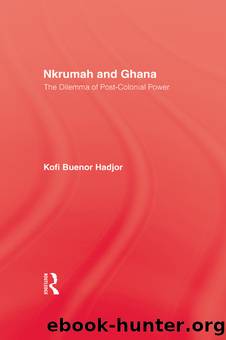Nkrumah Ghana by Hadjor

Author:Hadjor [Hadjor]
Language: eng
Format: epub
Tags: Social Science, Anthropology, General, Regional Studies
ISBN: 9781136148743
Google: DXcsBgAAQBAJ
Publisher: Routledge
Published: 2013-10-28T05:53:23+00:00
Notes
1 Nkrumah, Autobiography.
2 Ibid., p. 61.
3 Nkrumah, Towards Colonial Freedom, p. xiv.
4 Nkrumah, Autobiography, p. 78.
5 Ibid., p. 82.
6 Ibid., p. 92.
7 Ibid., p. 93.
8 Ibid., p. 94.
9 Ibid., p. 97.
10 Ibid.
11 Ibid., p. 115.
Chapter 5
The Painful Transition
By all rights the 1951 general election should have settled matters once and for all. The people had made their position clear: they wanted independence immediately. The British officials in Ghana knew that independence could not be indefinitely postponed. What they wanted was time â time to organise and time to strengthen their hold over Ghana. This was the real meaning of the term âtransfer of powerâ. Power can never be transferred. It is not divisible; you either wield it or you do not. The aim of âtransferring powerâ is to prolong the process of decolonisation and give the imperialists time to strengthen their local allies and if possible to domesticate the nationalist leadership.
Nkrumah was well aware of what the colonial authorities were up to. He was determined not to become a harmless figurehead and fall into the trap set up by the colonialists. In March 1952, the Governor, Sir Arden-Clarke, announced that henceforth Nkrumahâs title of âLeader of Government Businessâ should be replaced by that of âPrime Ministerâ. Many politicians would have been carried away by this honour, but Nkrumah kept his head. He understood that in a colonial framework an African prime minister would be restrained from fully promoting the interests of his people. It was for this reason that Nkrumah always emphasised the need for not losing sight of his movementâs final goal. In December 1952 he wrote:
Need we remind ourselves that the struggle is not over? The struggle still continues and intensifies as the end approaches. We have India, Ceylon and Burma to draw inspiration from. Ours, therefore, at this hour of our struggle, is to keep on organising and disciplining our forces for the final blow against imperialism in our country, so as to make Ghana take her rightful place among the community of nations.1
Nkrumah argued that Ghana could not achieve freedom if it relied merely on the good will and generosity of the colonial authorities. He argued for a strategy of Tactical Action, based on vigilance and pressure. It required the CPP to monitor carefully the activities of the imperialists. At the same time pressure had to be exerted on the colonial authorities so that positive steps were taken towards decolonisation. Nkrumah argued that if this strategy was to be successful then the CPP had to maintain a high level of mobilisation. A strong CPP enjoying popular support was the precondition for allowing Nkrumah to retain the initiative.
Through the application of Tactical Action, Nkrumah was able to push through a number of significant reforms. The Volta hydroelectric project was initiated this way. Significant progress was made in extending education. Improvements were made in housing and health facilities. New roads, railways and bridges were constructed. Although far from satisfying the needs of the people, the new projects represented a major gain for Ghana.
Download
This site does not store any files on its server. We only index and link to content provided by other sites. Please contact the content providers to delete copyright contents if any and email us, we'll remove relevant links or contents immediately.
| Anthropology | Archaeology |
| Philosophy | Politics & Government |
| Social Sciences | Sociology |
| Women's Studies |
The Leavers by Lisa Ko(6492)
Born to Run: by Christopher McDougall(6280)
iGen by Jean M. Twenge(4708)
Sapiens by Yuval Noah Harari(4553)
The Kite Runner by Khaled Hosseini(4475)
Spare by Prince Harry The Duke of Sussex(4223)
Bullshit Jobs by David Graeber(3190)
Livewired by David Eagleman(3135)
Goodbye Paradise(2978)
Never by Ken Follett(2910)
A Dictionary of Sociology by Unknown(2521)
Harry Potter 4 - Harry Potter and The Goblet of Fire by J.K.Rowling(2421)
The Club by A.L. Brooks(2374)
People of the Earth: An Introduction to World Prehistory by Dr. Brian Fagan & Nadia Durrani(2353)
Machine Learning at Scale with H2O by Gregory Keys | David Whiting(2320)
The Social Psychology of Inequality by Unknown(2316)
Harry Potter and the Order of the Phoenix (5) by J.K. Rowling(2235)
0041152001443424520 .pdf by Unknown(2228)
Harry Potter and the Deathly Hallows (7) by J.K. Rowling(2225)
